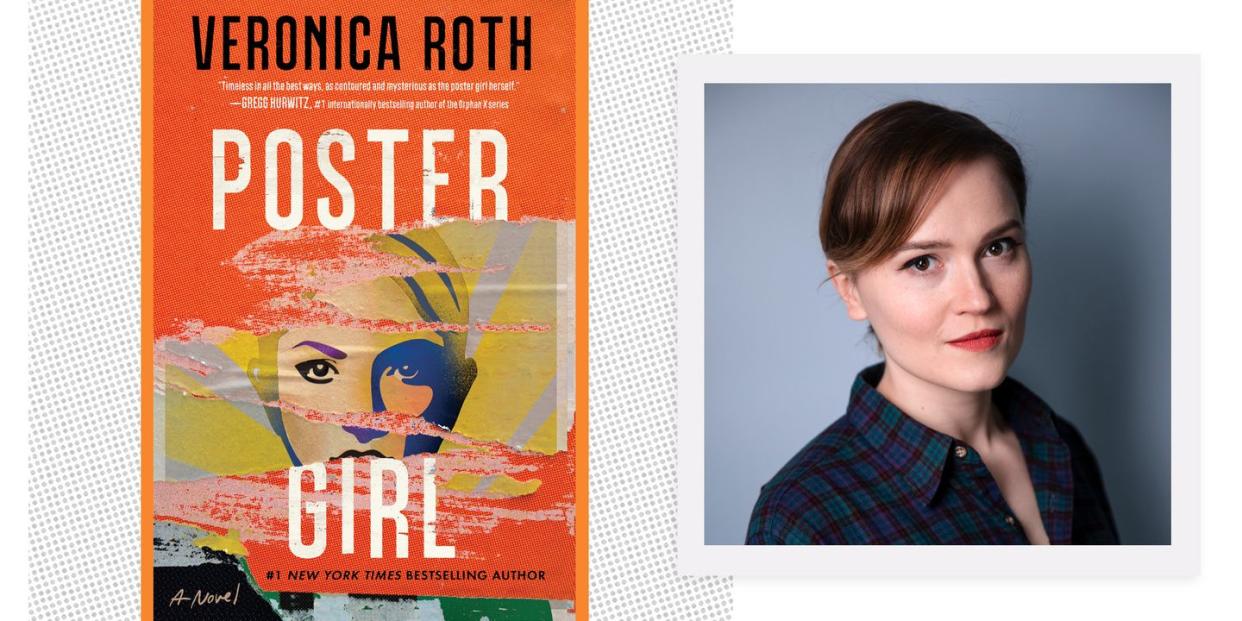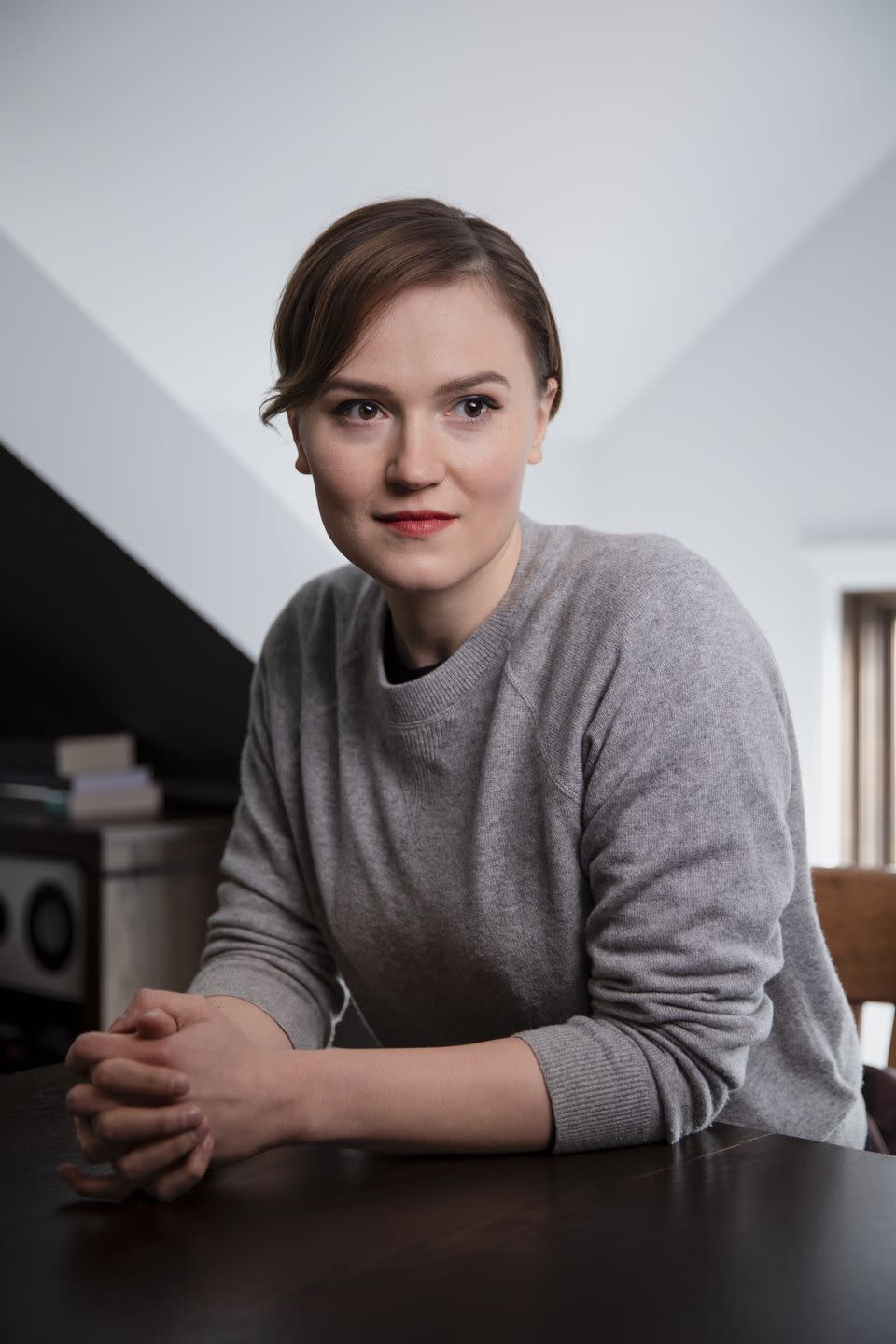Bestselling Author Veronica Roth Asks What Comes Next

- Oops!Something went wrong.Please try again later.
- Oops!Something went wrong.Please try again later.
"Hearst Magazines and Yahoo may earn commission or revenue on some items through the links below."
When it comes to the current wave of American aughts nostalgia, the authors of dystopian and paranormal young adult fiction are seizing the moment. Hunger Games creator Suzanne Collins released a prequel to her bestselling series at the start of the pandemic, while Stephanie Meyer published a companion novel to her smash-hit Twilight around the same time. A sequel series to the popular 2000s Maze Runner books also kicks off this fall — and the list goes on. But does every author from that era want to revisit the series that made them famous? For Veronica Roth, the brain (and fingertips) behind the massive Divergent franchise and author of Poster Girl, published on October 18, looking back is far more complicated.
Roth never set out to create a best-selling YA series. During her upbringing in the outer Chicago suburb of Barrington, Illinois, she didn’t even explicitly articulate a desire to become an author, though artistic pursuits run in the family; her mother, Barbara Ross, is a painter. It wasn’t until a freshman psychology class at Carleton College that Roth got an initial inkling of writerly inspiration. “We were learning about exposure therapy, which is a method of treating anxiety and phobias where you get repeatedly exposed to whatever stimulus provokes your fear response until your brain gets used to it,” she tells ELLE.com. “I thought to myself, ‘What if we could use some kind of technology to facilitate this?’”
At the time, her interest in how technology could help or hurt a person’s psychology—and what it meant to face those fears—was a vague notion. It took Roth nearly four years to flesh out the idea and put pen to paper, which she finally did as a college senior, having transferred to Northwestern University. “I didn’t use an outline or plan, and now I’m a pretty strict outliner,” she recalls with a laugh. “My approach is just a lot more methodical and organized, I think, than it used to be.” All of that internal back-and-forth paid off: She sold her debut novel, eventually titled Divergent, and then the rest of the trilogy; her first book was published in 2011 within a year of graduation.
Set in post-apocalyptic Chicago, the series follows 16-year-old Beatrice “Tris” Prior, who lives in a society where people are split among five different clear-cut personality factions. While residents decide which faction to officially join as teenagers, their roles in society are then fixed; any form of independence or autonomy is violently quelled by an oppressive ruling class. When Tris finds out that she doesn’t quite fit into any of these pre-ordained groups, the realization sets her on a long journey to dismantle the systems that keep people from being able to live outside the rigid system.
For many authors, the road to bestseller lists can take decades, if that level of success comes at all. But like something out of a plot in one of her novels, Roth’s own story took a turn: Seemingly overnight, she had a runaway success on her hands with Divergent and its subsequent sequels. To call the trilogy a phenomenon would be an understatement: The series has sold over 32 million copies; at the time of the final book’s release in 2013, it had the highest first-day sales numbers in HarperCollins history; and the novels eventually became a blockbuster Hollywood franchise, starring Shailene Woodley, that made roughly $765 million at the box office.
Roth’s three Divergent books weren’t the only dystopian YA novels to find massive followings in the late 2000s and early 2010s. Collins’ Hunger Games franchise was its own sensation at the time and was made into a film series as well, starring Jennifer Lawrence. Other books like the aforementioned Maze Runner, Matched, and The Selection were also huge hits with teen audiences.

But this era of wildly popular dystopian YA wasn’t without its critics. As readers, reviewers, and scholars alike look back, many point out that often the most popular series, such as The Hunger Games, centered mostly or entirely on white characters; but even when the first novel’s film adaptation casted Black actors in two visible roles, there was a different backlash to that too. Some books also faced criticism for using tired, unrealistic tropes (which one of these YA novels didn’t feature a wayward teen love triangle?) while completely ignoring larger more serious issues, like mental health. As time has gone on, questions have also surfaced around just how politically radical the books from this era really were, especially as the YA genre has become more diverse—both demographically and thematically—over the past five years or so.
When it came to criticism around the Divergent series, there was a great deal of anguish over Roth’s decision to (warning: major spoiler!) kill her main character Tris in the final book. While she knew that the conclusion would be controversial since ending the life of a protagonist typically is, Roth didn’t anticipate the level of vitriol that came from the decision, which included derision everywhere on the internet from Reddit to BuzzFeed. (There were even petitions at the time campaigning for a new ending in the movie franchise, even though she herself didn’t have control over that.)
Almost a decade after the final book’s publication though, Roth stands by how she chose to complete her series. “I always feel like I made the best choice I could in the moment with the level of skill that I had,” she reflects. Not every author could be as cerebral about facing such large-scale criticism, but Roth credits a key component of Northwestern’s creative writing program for her attitude years later: Students weren’t allowed to clarify their work as the class read and critiqued it. She believes this structure has made her more open to feedback and introspection, even over a decade after graduating. “That was my default mindset after the books came out. It’s always [about] trying to receive what people are saying and how they’re reacting without becoming defensive and overly justifying yourself. I tried to reflect on things,” she says. “Of course, that makes you doubt [yourself], like ‘Maybe I didn’t set this up well. Or maybe it wasn’t being read in the same way that I meant it.’ I don’t regret it. But I have thought a lot about it.”
At that point though, Roth was already considering her next move. She was in her late twenties as the Divergent era came to an end, and she had a “good” problem on her hands: She’d already checked off practically all of the big career boxes that took authors decades to achieve, including creating a bestselling series and seeing her work made into a gigantic movie franchise. What comes next?
After a time of serious soul searching, she decided the answer was to challenge herself creatively as much as possible. During the remainder of the 2010s, she wrote another YA series called Carve the Mark (for which she faced criticism for its racial politics and disability representation) and wrote two short story collections. But she made her biggest change in 2020 by publishing Chosen Ones, her first work of adult fiction. Chosen Ones tells the story of Sloane, one of five then-teenagers who defeated an evil force known as the Dark One a decade before the book begins. But even with all of the fame and celebrity that comes with being a “hero,” she and her compatriots are still dealing with the trauma and pain they endured in adolescence.
This fall, Roth is back with a new standalone adult novel called Poster Girl, which centers on Sonya, a young woman who’s incarcerated for being one of the propagandized “poster children” of a violent and now-overthrown regime. After 10 years in prison, she strikes a deal to find a missing child in order to earn her freedom, but her journey eventually forces her to confront many painful truths about both her past and the present.
Much of the dystopian YA world that Divergent thrived in a decade ago was focused on the fight for a better world and all of the sacrifices needed to get it. While they aren’t part of the series, Chosen Ones and Poster Girl look even further into the future, focusing on the aftermath of what happens after “good” wins and “evil” is defeated. Roth’s hypothesis? That neat storyline isn’t always as rosy and straightforward as it seems; instead, recovery and progress are often messy, painful, and complicated. Roth’s adult novels are entirely separate franchises, but the two books almost act as inverse reflections of this idea, with Chosen Ones tackling what members of the “winning” side go through after a conflict versus Poster Girl tackling what happens to members of the “losing” one. There are also lingering themes around surveillance and monitoring, which Roth jokes made her want to throw away her phone forever after writing.
Roth points out that this central theme in both of her adult fiction books mirrors her own meta struggles after Divergent. “That's something that adults understand [better than teens]: How do I navigate the world after these big milestones have been hit?” she explains. “While I obviously wasn’t recovering from a trauma, I did feel like I was channeling some of those thoughts specifically into Chosen Ones first and now Poster Girl: ‘What happens next? What happens now?’” And while it wasn’t necessarily her intention to take her original adolescent Divergent readers with her, many of her now-adult fans may relate to the obstacles and questions that these new, older characters are working through.
She says the move to adult fiction has also been a welcome change for her creatively, noting that the breakneck pace of the storylines in her earlier YA books left her wanting to try a different style where her writing had more room to breathe. “It was nice to really let myself live in the world for a little longer before getting the plot started with Chosen Ones and now [Poster Girl],” she says.
As for what she has coming up after Poster Girl, there’s plenty to look forward to. In particular, she’s publishing a novella-sized retelling of the Greek tragedy Antigone called Arch-Conspirator in February 2023, and she has several other novellas in the works. Like many authors though, the plans she had prior to the pandemic have shifted, and she foresees a few other changes coming. Chosen Ones, for instance, came out in April 2020, and she was originally slated to get the second book in that series out the door soon after. Instead, she switched gears to write Poster Girl, and now she’s not sure that the originally intended Chosen Ones sequel will ever see the light of day as her own creative aspirations have shifted.
But while some of her contemporaries are revisiting old worlds from past works, Roth is thinking about new horizons that’ll push her into unexplored realms of sci-fi. She has a few tricks up her sleeve. “Who knows?” she says with a smile. “I’ll keep writing. That’s my plan.”
You Might Also Like

